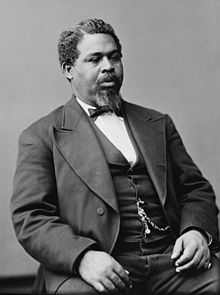
Back روبرت سمولز Arabic روبيرت سمالس ARZ روبرت ایسالس AZB Robert Smalls Czech Robert Smalls German Robert Smalls Spanish Robert Smalls French רוברט סמולס HE Robert Smalls ID Robert Smalls Italian
Robert Smalls | |
|---|---|
 | |
| Member of the U.S. House of Representatives from South Carolina's 7th district | |
| In office March 18, 1884 – March 3, 1887 | |
| Preceded by | Edmund W. M. Mackey |
| Succeeded by | William Elliott |
| Member of the U.S. House of Representatives from South Carolina's 5th district | |
| In office July 19, 1882 – March 3, 1883 | |
| Preceded by | George D. R. Tillman |
| Succeeded by | John J. Hemphill |
| In office March 4, 1875 – March 3, 1879 | |
| Preceded by | District Reestablished |
| Succeeded by | George D. Tillman |
| Member of the South Carolina Senate from Beaufort County | |
| In office November 22, 1870 – March 4, 1875 | |
| Preceded by | Jonathan Jasper Wright |
| Succeeded by | Samuel Greene |
| Member of the South Carolina House of Representatives from Beaufort County | |
| In office November 24, 1868 – November 22, 1870 | |
| Personal details | |
| Born | April 5, 1839 Beaufort, South Carolina, U.S. |
| Died | February 23, 1915 (aged 75) Beaufort, South Carolina, U.S. |
| Political party | Republican |
| Spouses | Hannah Jones
(m. 1856; died 1883)Annie Wigg
(m. 1890; died 1895) |
| Children | 4 |
| Signature | |
| Military service | |
| Allegiance | United States |
| Branch/service | United States Navy United States |
| Years of service | 1862–1868 |
| Rank | None (Civilian pilot and armed transport sea captain/captain) |
| Battles/wars | Blockade of Charleston • Battle of Simmon's Bluff • Second Battle of Pocotaligo • Second Battle of Fort Sumter Sherman's March to the Sea |
Robert Smalls (April 5, 1839 – February 23, 1915) was an American politician who was born into slavery in Beaufort, South Carolina. During the American Civil War, the still enslaved Smalls commandeered a Confederate transport ship in Charleston Harbor and sailed it from the Confederate-controlled waters of the harbor to the U.S. blockade that surrounded it. He then piloted the ship to the Union-controlled enclave in Beaufort–Port Royal–Hilton Head area, where it became a Union warship. In the process, he freed himself, his crew, and their families. His example and persuasion helped convince President Abraham Lincoln to accept African-American soldiers into the Union Army.
After the Civil War, Smalls returned to Beaufort and became a politician, winning election as a Republican to the South Carolina Legislature and the United States House of Representatives during the Reconstruction era. He authored state legislation providing for South Carolina to have the first free and compulsory public school system in the United States. He was a founder of the Republican Party of South Carolina and the last member of that party to represent South Carolina's 5th congressional district until the election of Mick Mulvaney in 2010.
© MMXXIII Rich X Search. We shall prevail. All rights reserved. Rich X Search